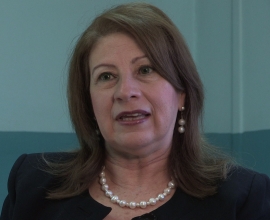A second chance for Cinderellas
13/01/2015
PrintMarta Iris Muñoz Cascante, Director of the Costa Rican Public Defender's Office
With the editorial in the newspaper La Nación published on Tuesday, 2nd December, entitled “The Cinderellas of Drug Trafficking”, the Public Defender's Office highlights an unprecedented initiative undertaken in the Costa Rica prison system, and the shift it represents in public policies for social assistance to a population affected by discrimination. I'm referring to the signing on 14th November of the Inter-Agency Coordination Protocol of the Network for Comprehensive Attention to Women Involved in Criminal Proceedings and their Vulnerable Dependent Family Members.
The paradigm for handling socially disadvantaged people who fall into conflict with criminal law typically is exclusion. These people are stigmatised in their communities and, in the job market, doors close in their faces over and over again. The treatment they receive tends to be humiliating, and their opportunities to make a change become materially impossible.
The implementation of this network opts for a different paradigm: that of inclusion. It aims to create conditions and opportunities for these vulnerable women that have gone through criminal proceedings and wish to build a dignified life project, both for themselves and for their families.
The construction of this inter-agency network is not a spontaneous occurrence. For several years now, a series of initiatives aimed at changing the situation of women in the prison system, especially those currently incarcerated, have been undertaken.
Efforts to date. Along these lines, the efforts made by the Public Defender's Office to achieve ratification of article 77 bis of the Psychoactive Drug Act, which introduces proportionality and gender specification when drugs are brought into a correctional facility.
The statistical data compiled by the Public Defender's Office used as the basis for the reform determined that many of these women, who had already served up to eight years in prison, were heads of households. Some had one child, others had four or more (up to eight). Most of them had not even completed primary education, and they worked in poorly paid and unstable jobs—as street vendors or domestic servants—or dedicated themselves to caring for, educating and supporting their children.
When the reform was finally applied in September 2013, over 150 women were released through compliance with the measures imposed by the judge, and, therefore, it became necessary to support them to avoid recidivism, taking into account that all of them were facing situations of vulnerability.
In some cases, the conditions under which they were returning to their homes after having been, some of them, in prison for up to eight years, were unknown. They didn't have the financial resources to return to their homes or pay for a hotel to spend the night; they were from areas far from the capital; moreover, they had larger needs, for example, a decent home, a family and school subsidy for their children's education, or a space in the daycare network so they could leave their small children while they continued with their studies or worked. They needed institutional assistance to become reintegrated into society and into their families.
Thus the Public Defender's Office proposed a project to EUROsociAL (a European programme for cooperation with Latin America) and the Office of Cooperation and International Relations of the Costa Rican Judiciary that would have an impact on promoting social cohesion, which is the purpose of EUROsociAL.
EUROsociAL's representatives responded decisively and offered to support the project by funding two experts—one European and the other Costa Rican—to do the work.
The responsibility fell on Costa Rican consultant Marcela Piedra and Spanish expert Cristina Mayordomo, who both did a magnificent job.
In Costa Rica, the Public Defender's Office set up the first contacts and meetings in order to join forces with different public institutions such as the National Institute for Women (INAMU), the Ministry of Justice, the Costa Rican Institute on Drugs (ICD), the Social Assistance Institute (IMAS), the National Child Welfare Agency (PANI), the National Vocational Institute (INA), and the Institute of Drug Abuse and Alcoholism (IAFA), among others, for the purpose of constructing an inter-agency network, an essential structure for the beneficiary women to pursue a life project capable of avoiding recidivism.
The joint work was key in the creation of protocols that will facilitate articulation and coordination between the institutions and the Public Defender's Office for a comprehensive approach to cases; an unprecedented achievement in public administration.
The expectations and challenges are high, and they need support, not only institutional but also from diverse social and business stakeholders.
It's a big job, but the experiences we've had up to now make us see that we're headed in the right direction and that the results will benefit many people individually, and the country in general.

